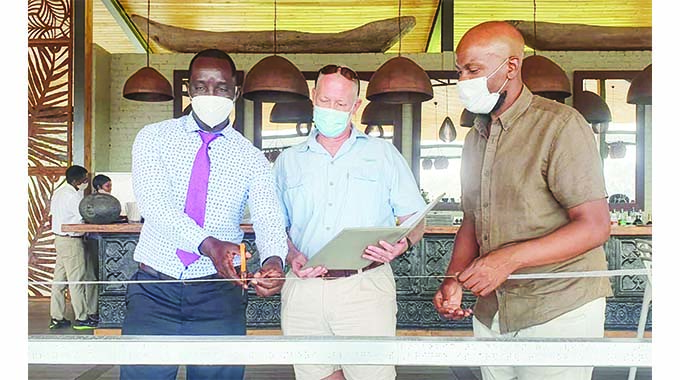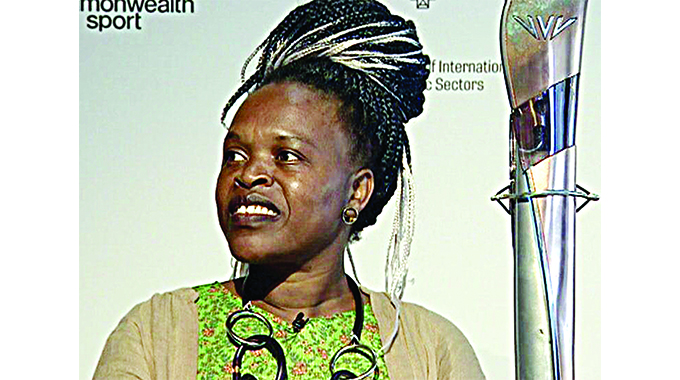Braille project to enhance inclusive tourism

Leonard Ncube, Victoria Falls Reporter
ZIMBABWE’S tourism has gone a gear up in ensuring inclusivity of all visitors after a local organisation started a project of equipping tourism resorts with braille to enhance access to hospitality and leisure places by visually impaired people.
In the past, there have been no braille material for visually impaired clients at hotels, restaurants and other leisure places.
There have been concerns by people living with disability about challenges they face in accessing public places and many interventions have focused on putting rails for those who use wheelchairs.
Visually impaired citizens were not considered as restaurants had no menu translated into braille. A plague with braille material was unveiled at Lookout Café on Wednesday, making Zimbabwe the first country in Southern Africa to have such an initiative.
This also comes as the country recently launched the National Disability Policy. The braille material was fitted on the rails of Lookout Café overlooking the gorge where visually impaired people can read about the restaurant, Victoria Falls and about local culture.
Mr Enock Munyaradzi Mawema, who is director of Mobi Tech Smith Zimbabwe, is the brains behind the initiative.
He partnered with the National Museums and Monuments of Zimbabwe, Wild Horizons Adventures and Love for Africa.
In his remarks, he said plans were underway to install braille at all popular hotels, eateries, museums and monuments countrywide with braille material for tourists to enjoy the luxury and hospitality.
“The initiative is based on simply making it accessible for the visually impaired within all our national parks and monuments, not forgetting our iconic locations such as Lookout Cafe and all galleries.
“This is the first in Zimbabwe and Southern Africa as we are the first to have implemented this project,” said Mr Mawema.
He said Wild Horizons created a story about the restaurant, Victoria Falls and local culture which visitors can read in braille.
Mr Mawema said this will help disseminate information and empower the marginalised vulnerable groups including future generations, in line with the Second Republic’s mantra of leaving no one behind in the drive towards vision 2030.
Tourism is one of the key economic pillars in the country and promoting the sector enhances economic growth and contributes to improving the country’s image in line with the National Development Strategy 1 (NDS1).
Mr Mawema said his passion for the disabled inspired the idea.
“We are targeting all people that have been excluded unintentionally. Accessibility is not only about having a hand rail but also having all access generally promoting empowerment,” he said.
Mr Mawema said Zimbabwe had the potential to accommodate a new and willing traveller and by simply empowering the next person, especially the disabled, the nation is empowering itself.
“We are promoting inclusivity where we are looking at giving full package to everyone travelling into Zimbabwe.”
Matopos, Khami Ruins and Great Zimbabwe heritage sites are next in line for braille installation. Mobi Tech Smith Zimbabwe specialises in new age solutions and self-funded the braille initiative in collaboration with Jairos Jiri, Love for Africa and Wild Horizons. Mr Mawema said the project will be spread across Africa.
He said the initiative will be a source of revenue for Jairos Jiri as they will be translating information into braille. Tourism executive Ms Shelly Cox said the project adds a huge amount of value to the ongoing recovery efforts taking place across Zimbabwe.
“The vision to install Braille rails at prominent and historical sites across the country is really reflective of the drive taking place to ensure inclusivity and accessibility for all travellers, but also of the concept to build the destination back better in a post Covid-19 era,” she said.
“We are really supportive and appreciative of Enock’s hard work to bring the Braille rails to Victoria Falls.”
Victoria Falls Mayor Councillor Somveli Dlamini said all along people with disabilities felt left out as most tour operators did not cater for their needs.
“We applaud the initiative of bringing in braille as this will give visually impaired people access to tourism activities.
As a tourism host city, we are enthused by this development. We must embrace this not only in tourism but in all other aspects of life,” Clr Dlamini. — @ncubeleon









Comments